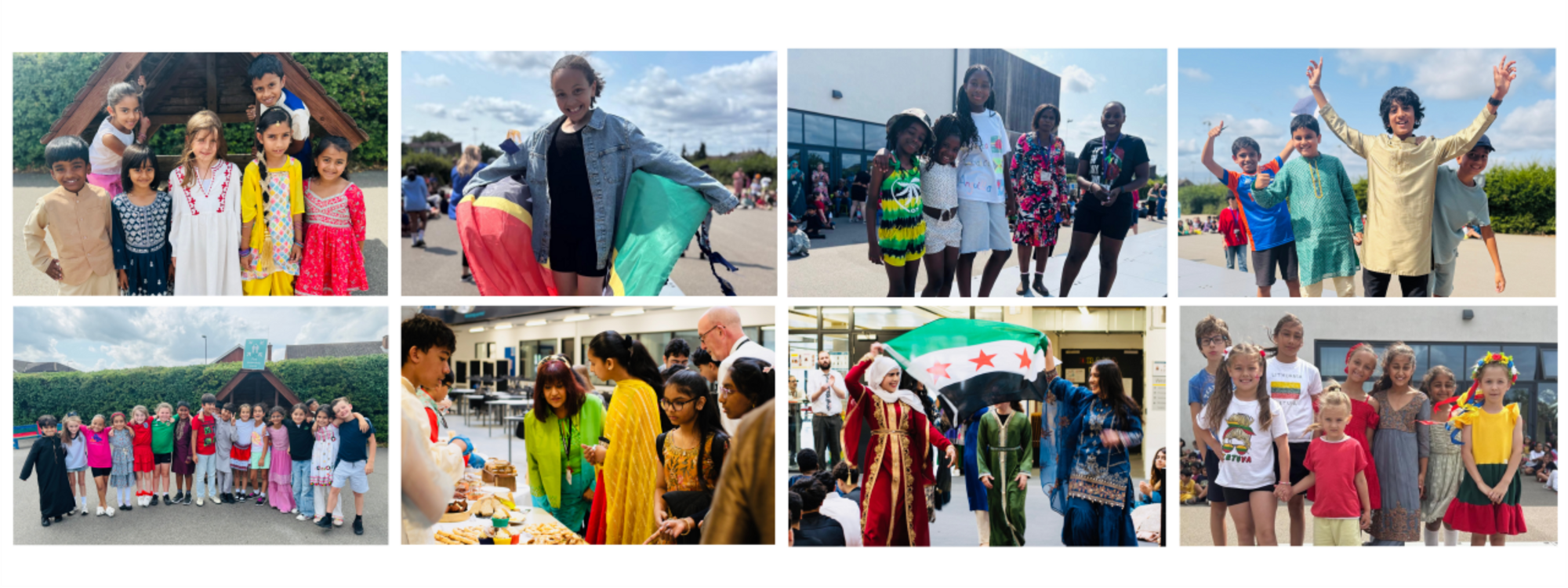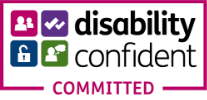Equity, Diversity, Inclusion and Belonging
Equity, diversity, inclusion, and belonging (EDIB) are values that guide us and influence what we do. Everyone’s life journey is unique, shaped by different backgrounds, experiences and challenges. You might join us as a child, a student, as a family, a member of staff or volunteer. We want to welcome you, listen to you and value your uniqueness.
This is how we bring to life our vision: ‘One community. Many ideas. Everyone’s future.’
An Overview of our EDIB ambition
Promoting Diversity and Equity
‘Diversity shapes us. Our staff and students bring a wealth of different perspectives to our trust.’
We celebrate diversity as an important part of Trust life. We prepare our students to stay curious about a world filled with different ideas and traditions. We mark national awareness days such as Neurodiversity Celebration Week and host culture days across all our schools. Opportunities are created for every voice and identity to be seen, heard, and valued.
Equality Act 2010: Protected Characteristics
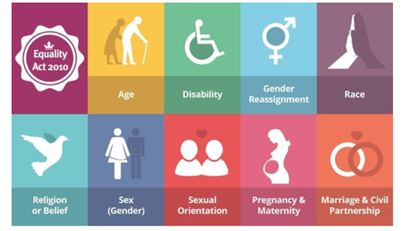
We stand firmly against prejudice and unfair discrimination in all its forms. We understand that fair treatment does not always equal the same treatment. We work hard to remove barriers to help students, children and staff to fully access learning opportunities. Targeted support and inclusive practice help us adapt and innovate. We aim to create an environment where everyone can succeed and be their best.
Heritage Days are a much-loved tradition where the school communities come together. We celebrate the cultures, languages, and traditions that shape who we are. These events are a highlight of the year, filled with music, dance, food, storytelling, and shared pride. These celebrations deepen understanding, strengthen connections, and foster a culture of acceptance. They also reflect the diversity of the world around us.
Our staff and students trace their family heritage to over 76 different countries.

Creating an Inclusive Community
‘The school is characterised by mutual respect and tolerance, with excellent relationships between individuals from across the school community’ Ofsted
We believe in the power of an inclusive community built on mutual respect and acceptance. Our staff are passionate about creating an environment where everyone can thrive. By valuing diverse perspectives and ideas, we ensure that our schools are places where everyone can flourish. This allows everybody to contribute to the best possible outcomes. We acknowledge that each of us is different, with unique needs and backgrounds. We celebrate our differences and work together to make our community a better place for all.
Fostering a Sense of Belonging
‘Pupils report that it is easy to be yourself within this inclusive culture with high levels of respect for diversity’ Ofsted
Our Trust is committed to creating an environment where everybody feels they belong and are listened to. True belonging goes beyond inclusion. It means every member of the community feels heard, respected, and valued for who they are. We work to create spaces where individuals feel safe to express themselves and where their identities are affirmed. We want everyone to know they are an essential part of the Trust community. Developing an understanding of others on an ongoing basis is key to creating meaningful acceptance. Strong relationships, a caring culture and the celebration of individuality make this possible. We strive to ensure that everyone knows they truly belong here.
Use the expandable sections below to find out more.
How We Are Realising This Ambition - The Staff Experience & Feedback
The Staff Experience
In 2021, the Trust ran its first full staff survey on equality, diversity and inclusion. Edurio, an external partner, designed the survey. This helped us compare our results with other schools. There were high levels of engagement with the survey, with 87% of our staff completing it. The aim was to build an evidence-based view of equality, diversity and inclusion. This enabled the Trust to create a focused and sustainable action plan to further improve the experience of our staff.
It showed that our schools demonstrate a strength around staff diversity compared to other schools. Our survey partner reported that this put us in the top five multi-academy trusts across the country on diversity measures. We value diversity and the continuous learning it brings. We recognise we can go even further to increase staff diversity. We value the rich mix of experiences and backgrounds that we have and the continuous learning it brings.
The survey also provided us with valuable insight into where we might improve. As a direct result of this feedback, we took action to:
- diversify our staff interview panels
- enhance our communication around opportunities for promotion
- expand communication around pay to increase transparency
- develop new opportunities to increase work flexibility (the Staff Feedback below provides more information).
Ongoing Staff Feedback Ensures Our Policies & Practice Evolve with Changing Needs
We have continued to undertake mini surveys and staff focus groups since 2021, to check in on the experiences of our colleagues. This supports us in continuing to understand and respond to the needs of our staff. For example in 2024, based on feedback from colleagues we launched our Trust Menopause Policy. This set out the Trust’s approach to supporting staff experiencing menopausal symptoms. We see the work on improving equity, inclusion and belonging as a continuous and critical priority. We look forward to providing further updates on our progress over time.
Flexible Working
The Trust encourages and enables flexible working opportunities. We want to support staff to achieve a better balance between work and any other life priorities. We know flexibility is important to our staff. To support staff wellbeing, we launched "Extra Flex," our flexible working scheme. We were one of the first UK trusts to go beyond what’s required by law. Our staff are now better able to work in ways that meet their needs.
Our ‘Extra Flex’ scheme has been highly successful, with over 85% of flexible working requests approved each year. In 2025, nearly two-thirds of our staff (192 out of 305) work part-time, many on term-time contracts. Increasingly, staff also work from home for part of their week or alter their start and end times to fit around other commitments.
The Student Experience
We ensure that every student receives the best education, with equal access to the curriculum.
We celebrate differences and encourage students to build healthy relationships. This includes respecting the rights and responsibilities of others. Our curriculum promotes cultural capital, teaching about different people, cultures and life experiences. We aim to prepare our children for the challenges of the 21st century.
We understand that ongoing learning is key to meaningful change. EDIB are woven into our curriculum across all schools in the Trust. Our curriculum is designed to provide students with a deep understanding of inequality, its causes, and its effects. We want our students to be aware of these issues and to be equipped with the knowledge and skills to address them.
Our curriculum uses diverse resources and includes engaging sessions from external experts. We aim to represent all members of the community in all that we do. We emphasise pride in one’s background and identity at every opportunity. We want our children to feel valued and positively represented.
Partnerships and Community Engagement
We believe in the power of partnerships with parents, carers, and the wider community. We use inclusive language and actively encourage participation in school life. We always aim to ensure the way we communicate is fair and respectful. We often work with parents and the community to build understanding and raise awareness of these critical issues.
Our primary schools regularly host Family Forums. This gives parents and carers a meaningful platform to voice their opinions and help us to shape school policies and practices.
We actively involve our wider community by offering inclusive and accessible opportunities. One example is our annual family coach trip to London. This trip supports families facing barriers like transport issues or mobility challenges. This door-to-door trip helps families enjoy cultural experiences they might not otherwise access. We also provide tailored guides to help them navigate museums and make the most of their visit.
We recognise that some members of our community, like first-time mothers and older adults, may feel isolated. To address this, we run a range of initiatives that build connections and reduce loneliness.
In response to COVID-19’s impact on children and families, we launched the Playing with the Museum initiative. Funded by the National Lottery Heritage Fund, it offered inclusive engaging activities. The aim of this initiative was to build social skills and support well-being. It also created opportunities for elders in our community to come into our schools and interact with our children. It included learning sessions for new families and an intergenerational project. Elders visited our schools and shared their knowledge and experiences. This enriched the learning environment for our children and promoted community connection.
Our commitment to including and celebrating older generations extend further. Choirs from both of our primary schools regularly visit local care homes to perform, bringing joy and music directly to residents.
At the secondary school, we host an annual Christmas dinner for elderly members of the community. This much-loved event offers warmth, companionship and entertainment provided by our students. Our secondary social care students also run projects to improve understanding of how to help and support older people. This helps build empathy and connections between generations.
Key Initiatives Across Our Schools
Each of our schools are passionate about driving progress on EDIB. We are pleased to share some further highlights from each of our schools below.
The Langley Academy Primary (TLAP)
Equity, Diversity, Inclusion and Belonging at TLAP
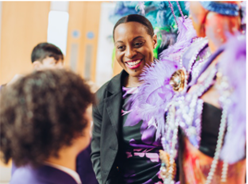 At The Langley Academy Primary, we celebrate diversity and promote inclusion as a vital part of our school ethos. Rooted in our core value of Family and the Trust’s vision of One community. Many ideas. Everyone’s future, we ensure every child feels valued, represented, and proud of their identity.
At The Langley Academy Primary, we celebrate diversity and promote inclusion as a vital part of our school ethos. Rooted in our core value of Family and the Trust’s vision of One community. Many ideas. Everyone’s future, we ensure every child feels valued, represented, and proud of their identity.
Through our lessons, class names and pupil-led projects we help everyone feel proud. We challenge stereotypes and promote respect for all backgrounds and abilities. Our work aligns with the Equality Act (2010) and prepares children to thrive in a diverse, ever-changing world.
What It Looks Like in Our Classrooms
Each year our Discovery Days teach children about diversity. Fun and informative sessions are led by different authors and poetry workshops. This helps our children better understand the world around them.
 Our curriculum highlights figures such Mary Seacole, Nelson Mandela, Martin Luther King Jr., and Stevie Wonder. In Year Three, students learn about the Civil Rights Movement and Rosa Parks. Our resources reflect the school’s diversity. Children play with a variety of world foods and dolls reflecting different ethnicities. Our inclusive displays and 'Key Texts' show a range of characters and races.
Our curriculum highlights figures such Mary Seacole, Nelson Mandela, Martin Luther King Jr., and Stevie Wonder. In Year Three, students learn about the Civil Rights Movement and Rosa Parks. Our resources reflect the school’s diversity. Children play with a variety of world foods and dolls reflecting different ethnicities. Our inclusive displays and 'Key Texts' show a range of characters and races.
Our Commitment to Inclusive Education
As part of our whole-school commitment to inclusion, we have joined the Partnerships for Inclusion of Neurodiversity in Schools (PINS) Programme, a national initiative dedicated to enhancing support for neurodiverse children in mainstream primary schools.
PINS focuses on early intervention and the creation of learning environments where every child can thrive. This work is built on a strong partnership between parents, schools, families, and the local authority, all working together to improve provision and outcomes for every child.
Throughout the year, dedicated meetings take place as we review and refine our provision, ensuring we continue to learn and improve. We are united in ensuring all of our pupils feel supported, valued and included in every aspect of school life.
For further information, please also see our TLAP policies below:
- Accessibility Plan
- Equality Objectives Statement
- Inclusion Policy
- SEN Policy
The Langley Heritage Primary (TLHP)
 At TLHP we are proud of our deep-rooted inclusive practice. We actively address issues of racism and prejudice through discussions with both children and staff. We challenge discrimination in a multitude of ways.
At TLHP we are proud of our deep-rooted inclusive practice. We actively address issues of racism and prejudice through discussions with both children and staff. We challenge discrimination in a multitude of ways.
What It Looks Like in Our Classrooms
Our inclusive curriculum, including PSHCE, helps students explore and challenge unconscious biases. It features people who look different from each other and encourages students to reflect on sometimes unknown biases we hold. Partnering with local charity Aik Saath ‘Together as One’, we provide training and workshops for staff and children. We regularly engage our children in discussing global events. Opening discussions in an age-appropriate way and encouraging them to profile influential figures. We also give parents resources to enable these conversations to continue at home.
We are delighted that 82% of parents feel very or extremely confident that TLHP offers an inclusive curriculum and environment. Parents highlighted our 'great communication.' They said the school 'inspires all children and provides an inclusive place to learn.' They added it helps children 'achieve and develop core skills' and gives 'great opportunities to grow strengths and talents'.
Our Commitment to Inclusive Education
As part of our whole-school commitment to inclusion, we have joined the Partnerships for Inclusion of Neurodiversity in Schools (PINS) Programme, a national initiative dedicated to enhancing support for neurodiverse children in mainstream primary schools.
PINS focuses on early intervention and the creation of learning environments where every child can thrive. Our first step on this journey is to understand our current baseline, enabling us to develop a clear and tangible action plan that ensures all pupils feel supported, valued, and included in every aspect of school life.
We Are Proud to Be Recognised for Our Commitment to Inclusion
We are honoured to have received the national Race Equality Mark Award. This recognises our ongoing work to create an inclusive culture. Creating an environment where all ethnicities are equally valued, respected, and celebrated.
This achievement reflects the collective efforts of our children, staff, and community. Together, we aim to make sure everyone feels like they belong. We challenge inequality, whether in relation to race or other protected characteristics.
While we are proud of this recognition, we know that true inclusion is an ongoing journey. We remain committed to listening, learning, and growing together.
For further information, please also see our TLHP policies below:
- Accessibility Plan
- Equality Objectives Statement
- SEN Information Report
- SEN Policy
The Langley Academy (TLA)
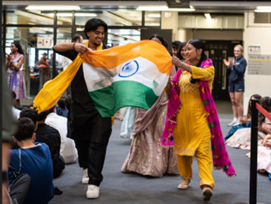 At The Langley Academy, we aim to nurture global citizens. We encourage critical thinkers, ready to take positive action to shape the future. Our curriculum and pastoral systems teach students about different people, cultures, and ideas. This promotes inclusivity and understanding. We provide opportunities for students to explore and express their own identities. Our Behaviour Policy firmly challenges discrimination to uphold respect for all protected characteristics.
At The Langley Academy, we aim to nurture global citizens. We encourage critical thinkers, ready to take positive action to shape the future. Our curriculum and pastoral systems teach students about different people, cultures, and ideas. This promotes inclusivity and understanding. We provide opportunities for students to explore and express their own identities. Our Behaviour Policy firmly challenges discrimination to uphold respect for all protected characteristics.
What it looks like in our school
As you enter the atrium at The Langley Academy, you see our House banners.
Our staff and students worked together to choose significant people to represent our six Houses. These all have links to the academy, to Langley or to Slough and celebrate our diverse history. They include:
Caroline Herschel, a brilliant astronomer and the first female professional scientist. Caroline also lived with long term health conditions after contracting typhus at an early age.
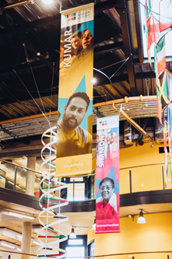 Pravesh Kumar MBE, a film and theatre director from Langley. Pravesh champions women’s rights in the arts and started his own theatre company to ensure diverse representation in the sector.
Pravesh Kumar MBE, a film and theatre director from Langley. Pravesh champions women’s rights in the arts and started his own theatre company to ensure diverse representation in the sector.
Lydia Simmons, Mayor of Slough, the first black woman to become a mayor in England. Lydia campaigned for and achieved improved social housing for residents, making people’s lives better.
Andy Holmes, Olympic Champion and rowing coach. Andy was the academy’s first Director of Rowing. He believed that rowing should be for everyone to take part in. His spirit lives on with our rowing team.
Hanging alongside the banners you can see a display of 76 flags representing the diversity of our school community. Students take pride in seeing their national flags prominently displayed at the heart of the building. Our Neurodiversity Umbrellas hang across the atrium as a reminder that neurodiversity is an umbrella term. Different conditions need specific responses to genuinely include everyone. The colourful umbrellas create a vibrant display, celebrating neurodiversity. They spark conversation, raise awareness, and promote acceptance.
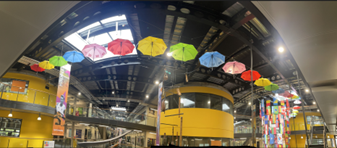
Spaces and places for people be themselves
Our Reflection Room is open at lunch times for students and staff to reflect/pray, meditate or simply sit in silence and find their own mental space. We have a LGBTQ+ enrichment club where students can share views and experiences. Our Hearing Resource Base gives specialist support to hearing impaired students. Many SEND students also find nurturing support in our Student Support Unit.
 Supporting Wellbeing with 'More Good Days at School'
Supporting Wellbeing with 'More Good Days at School'
At The Langley Academy, we are proud to have been part of the ‘More Good Days at School’ programme. This is a Trauma Informed Approach that equips our teachers with the tools to help staff and students manage emotional responses.
The programme helps staff foster emotional resilience and self-awareness in our students. This helps students better access their learning, build positive relationships, and thrive in and out of the classroom.
This is all part of our commitment to creating a school environment where every student has the support they need to succeed.
Starting powerful conversations in the Classroom that have a lasting impact in the wider world
At our school, we believe education goes beyond textbooks. That’s why we invite inspiring external speakers to help our students engage with some of the most important issues facing society today. These sessions spark meaningful conversations, build awareness, and encourage action.
We welcome speakers from organisations such as Show Racism the Red Card. They lead workshops on understanding and challenging racism. Students explore where racism comes from and how people can be treated unfairly in everyday life. They learn why it’s important to speak up and take action to stop racism and not just ignore it.
 These thought-provoking sessions encourage students to be curious, ask questions, and challenge assumptions. It is a reminder that change starts with us— we each have a role in creating a more inclusive, anti-racist culture.
These thought-provoking sessions encourage students to be curious, ask questions, and challenge assumptions. It is a reminder that change starts with us— we each have a role in creating a more inclusive, anti-racist culture.
For further information, please also see the TLA policies page:
- Accessibility Plan
- Equality Statement & Objectives
- SEND Policy
Key Initiatives Across Our Trust
Alongside our general work to improve EDIB, we have two key areas of specific focus. These are areas where we want to lead meaningful change
Our Ongoing Commitment
Our commitment to EDIB is reflected in our policies, training, and the ongoing work of our schools.
We believe EDIB runs through the veins of the Arbib Education Trust. It guides us to create a community where everyone is valued, respected, and able to thrive.
Our Equity, Diversity, Inclusion, and Belonging Policy helps us support individual rights. It also reminds us of our duty to treat others with respect. We review it every year to ensure we are continuously challenging ourselves to create an inclusive community. A community in which everyone feels they belong.
Together, we will continue to create an inclusive community where everyone belongs. We will share updates on our progress and we welcome any suggestions on how to make our Trust fairer and more welcoming for everyone.
